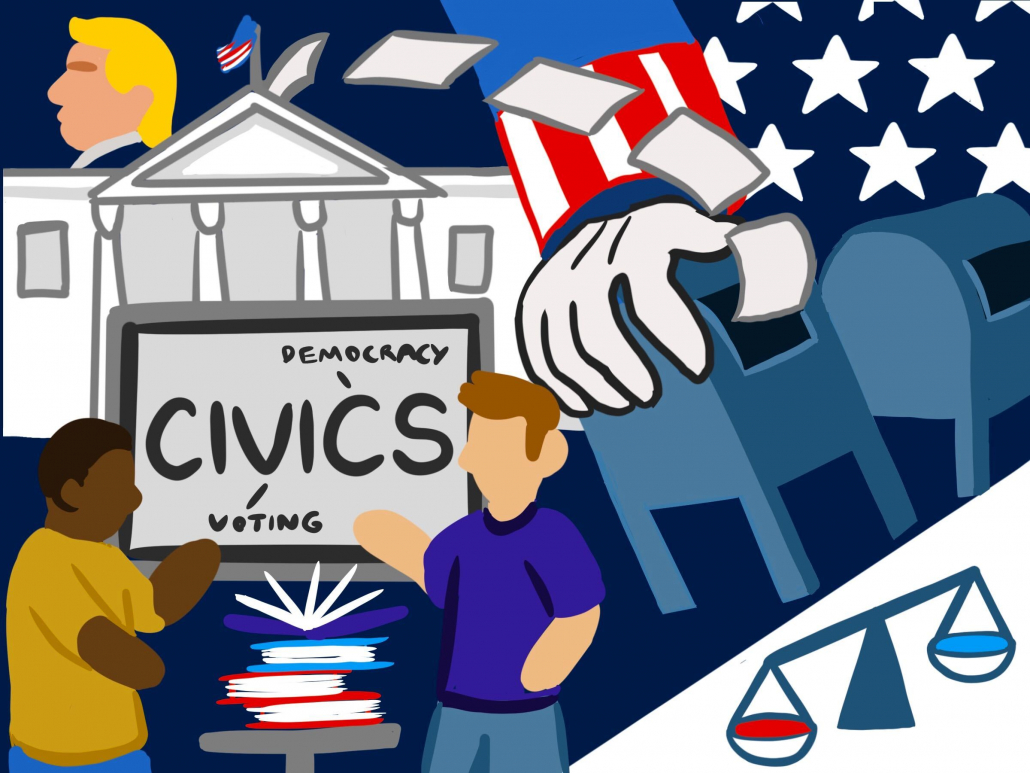Stronger civics education is needed in the United States

This year’s presidential election will be unlike any other. The virtualization of the two campaigns due to the coronavirus crisis is a large part of this assertion, but even more pressing is the level of fabrication and legal maneuvering being carried out, specifically at the hands of President Donald Trump’s administration. Unprecedented rhetoric and actions by the president and his campaign highlight the need for improved civics education to ensure that no American can be easily fooled by a leader’s abuse of power.
From claiming there will be wild amounts of voter fraud and suing states such as Nevada to stop them from sending mail-in ballots to all registered voters to using his executive power to slow down the postal service and suggesting that North Carolinians should vote twice, the president is doing what he can to tilt this election in his favor with underhanded methods, some never seen before.
It traditionally benefits Republicans if less of the population votes and that is exactly what Trump is attempting to achieve. Sadly, a lot of his remarks are meant to cast doubt over the sanctity of the election in case it does not go his way, and his constant allusions to election fraud strongly suggest that he will challenge the results of a losing election.
The problem does not stop with threats to voting rights. The president’s borderline tactics carry over to general campaigning, as he broke precedent by using the White House as the setting for his acceptance speech at the Republican National Convention.
Although this is legal as the president is exempt from the Hatch Act (a 1939 law prohibiting federal employees from engaging in forms of political activity), Republicans violated the Hatch Act several other times throughout the convention by using their government powers for political gain. This included televising a naturalization ceremony, a presidential pardon and Secretary of State Mike Pompeo making his speech while on a diplomatic trip to Israel.
Casting doubt on an election, taking measures to make it more difficult to vote and using government positions to help win a supposedly “free and fair” election does not sound remotely like the great democracy the United States is.
The onus is on Americans to ensure that this election year does not spiral into further deterioration of our democratic republic. To help our populace be more educated and aware of their rights and the fundamental principles of a democracy, there should be a larger emphasis on civics education in schools, from elementary school through college. Learning civics is an important step toward becoming an aware, active participant in U.S. democracy and all school districts, private schools and colleges should see it as imperative to helping their students develop into contributing members of society.
A consistent dose of civics classes starting at a young age and continuing every few years rather than the usual throwaway class in high school will help ingrain the importance of democracy and democratic tools such as voting and protesting. This will help the American people be better equipped to recognize potential threats or attacks on our democracy and know how to adequately address them.
Stronger civics education would help people understand the dangers presented when a presidential administration commits itself to keeping some Americans from voting or abuses its power for political gain. At the moment, these moves seem fairly unchecked, although the results of this election will show whether that is really the case. Regardless of the results, this election year has brought our democracy to a crossroads and it is our duty as U.S. citizens to learn about, understand and protect our democracy.

